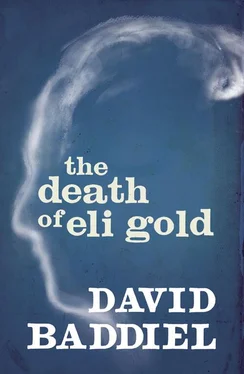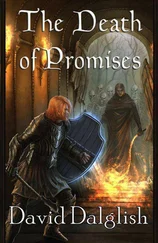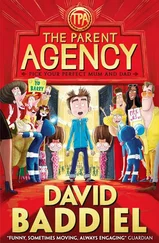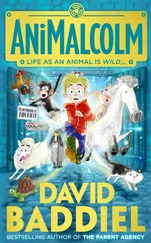But he knew, even as he watched her pass through the door, under the mural of the angel Moroni, that Hitler’s baptism was just the catalyst. She had grown disenchanted when he had taken Sedona, his second wife’s daughter, to be his fifth wife. He had seen it when he had gathered the family around him in the living room of their then house, the one at the point in American Fork where East State Road becomes West State Road, and announced his intention. They were crammed in: the house seemed to grow smaller as the family burgeoned. Everyone else was joyful, clapping and rising to congratulate Sedona and her mother, but Janey just stayed on a chair by the window, staring straight at him. He returned her stare, blankly, neutrally, letting his good eye ask her what her problem might be; but this was hard to do, because so many of his wives and children were hugging him, and because her eyes were so full of hurt and disgust and anger. They held each other’s line of vision, while the others danced between them, until at last she turned away and looked through the glass towards the white-tipped mountains of the Utah Valley.
He decides to leave the area around Mount Sinai Hospital to look for a hotel. He cannot, though, afford any of the hotels in the mid-town area. This should not be part of my story, he thinks. I am an avenging angel; I have the weight of destiny on my shoulders. But I cannot afford any of the hotels in the mid-town area.
He walks and walks. His right arm, where he has a touch of arthritis in the elbow, aches with the weight of pulling his suitcase, a blue checked bag on wheels. On his left shoulder blade, the remnants of his tattoo – a Confederate flag, removed soon after joining the Church, because the head of their Temple, Elder James LaMoine McIntyre, known to everyone as Uncle Jimmy, explained to him that the body is perfected after death – itches. To keep him going he recites in his head, for every step, the names of his family. First, the wives: step, Leah, step, Ambree, step, Lorinda, step, Angel, step, Sedona, step, RoLyne. Then, for every step, a son or daughter: step, Janey, step, Clela, step, Fallon, step, Levoy, step, Leah, step, Darlene, step, KalieJo, step, Orus, step Rustin, step, Mayna, step, Prynne, step, Dar, step, Hosietta, step, Velroy, step, Elin. Then, a final step, and a final name: Pauline. Then he begins again. After he has been doing this for a few hours, it occurs to him that three of his children – Darlene, Rustin, Levoy – are, in fact, step-children. This takes him aback for a second, makes him stop. For a moment it strikes him as funny. But he represses the urge to laugh, and reorders it in his head as a sign, a small sign, that there is a pattern to all things. He walks on.
The list allows him to resist New York. He has never been here before – he has never been out of Utah – but he knows enough about it from when he was young, and from what he has seen on the internet, to understand that the City will distract him from his destiny. He keeps his head down, focusing on his feet, on hitting a new name with each foot, and refuses the City – he refuses Park Avenue, even as he walks all the way down it; he refuses the Chrysler Building and the Empire State and the Waldorf-Astoria and Grand Central Station and One And Eleven Madison and all the other temptations of the Kingdom of Man. He refuses even the yellow taxis and the steam rising from the street gratings and the hotdog sellers and the WALK/ DON’T WALK signs, the things about Manhattan that might chime with its movie self, and which might draw him in through living up to its mythology, revealing its icons like a peacock its feathers.
Just as he is getting too hot and tired to continue – the sun has been stoking the air all afternoon, and underneath his clothes his sacred white undergarments are heavy with sweat – he finds a cheap place, on East 25th Street, called the Condesa Inn. The Condesa Inn is a hippy hotel. He likes that. He was a hippy himself, once. He was a Mormon then, too, but a regular one, just born into the Church of the Latter-day Saints, and not too fussed about it neither. Him and his sister used to smoke a lot of dope together, and listen to a band called The Outlaws. He loved her most then. It was at an Outlaws gig when he first saw Jesus – the Azteca in Salt Lake, in 1975. Hughie Thomasson was really going for it, on ‘Searching’, their greatest song, their ‘Free Bird’. Hughie had just sung: Searching through the seven skies/for some place your soul can fly , and hit the strings of his Stratocaster, when he saw him: Jesu, the Lamb, rising from behind the drum kit, arms outstretched, smiling a smile that widened further as Hughie and Billy Jones dug into their guitar battle like the out-there Confederate heroes they were. It filled his heart with joy. When he told Pauline afterwards she was so pleased for him, even though she made a joke about how good the dope must have been that they smoked before they went into the club. He didn’t mind that joke. He knew she knew it was true: and that she would accept, in time, that he had to forsake Salt Lake City for American Fork, and the Church of the Latter-day Saints for the greater truth of the Latter Day Church of the True Christ.
He knows that the Condesa Inn is the hotel he should be staying in, because every room is painted in a different way, each by a different artist. The woman on reception, who looks like she may have been a hippy as well once, shows him photographs of the rooms that are available, and there is one with a picture of Jesus across the wall. The woman says it is not Jesus – she says it is the lead singer of the Flaming Lips – but he knows that it is, because the bearded half-naked figure is enveloped by an angel. Then the woman says:
– Well, if you want it to be Jesus, I guess it’s Jesus. It’s eighty dollars a night, shared bathroom.
He smiles a little, a smile the woman would not be able to read. At home, he shares one bathroom with twenty-one other family members. Most days, the waiting to get into it is so long he ends up going to the bathroom outside, behind the privet hedge that surrounds their small patch of land.
– Is it a smoking room?
– No. We don’t have any rooms you can smoke in any more. You have to go stand outside. Sorry.
– OK. Do you have wi-fi internet access?
– We do. It comes and goes a bit, but, yeah.
– How much does it cost?
– On the house. When you can get it, that is.
– Is there a password?
She picks up a card with the Condesa Inn logo on it, and a pen, and scribbles on the back: H98BCARL. She hands it over, smiling. He looks at it and feels disappointed. He had thought that this word might speak to him: he had thought it would be a word connected with his destiny, or maybe at least with their shared hippiness, OUTLAWS1, or something.
OK, he says, and goes up to the room, with his suitcase. They do have a porter in the Condesa Inn, but he does not want the porter to carry his suitcase, because he only has a small amount of money and cannot afford tips. It contains, along with two changes of outer clothes and five of sacred underclothes, his own copy of The Book of Mormon: An Account Written By The Hand of Mormon Upon Plates Taken From The Plates of Nephi , his Dell PC laptop computer, the photograph of his sister, before she was raped by The Great Satan, wearing her favourite red-check dress, smiling and waving, looking so fine, and his gun. It is the gun, an Armscor 206 .38, which he bought online from GunsAmerica.com, for $308, as new, that has meant that he has to travel all the way from Utah by bus; the gun that has meant he cannot travel by airplane. There are ways of getting a gun on an airplane – he has learnt this from surfing the web, from reading the posts of some of the jihadis – but the ways are difficult and he decided against it. He goes up to the room alone.
Читать дальше












